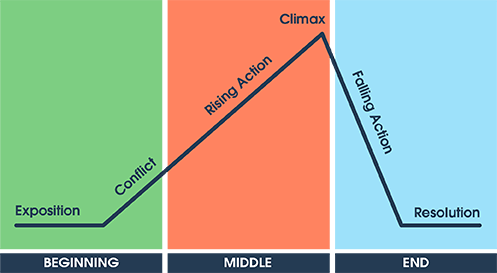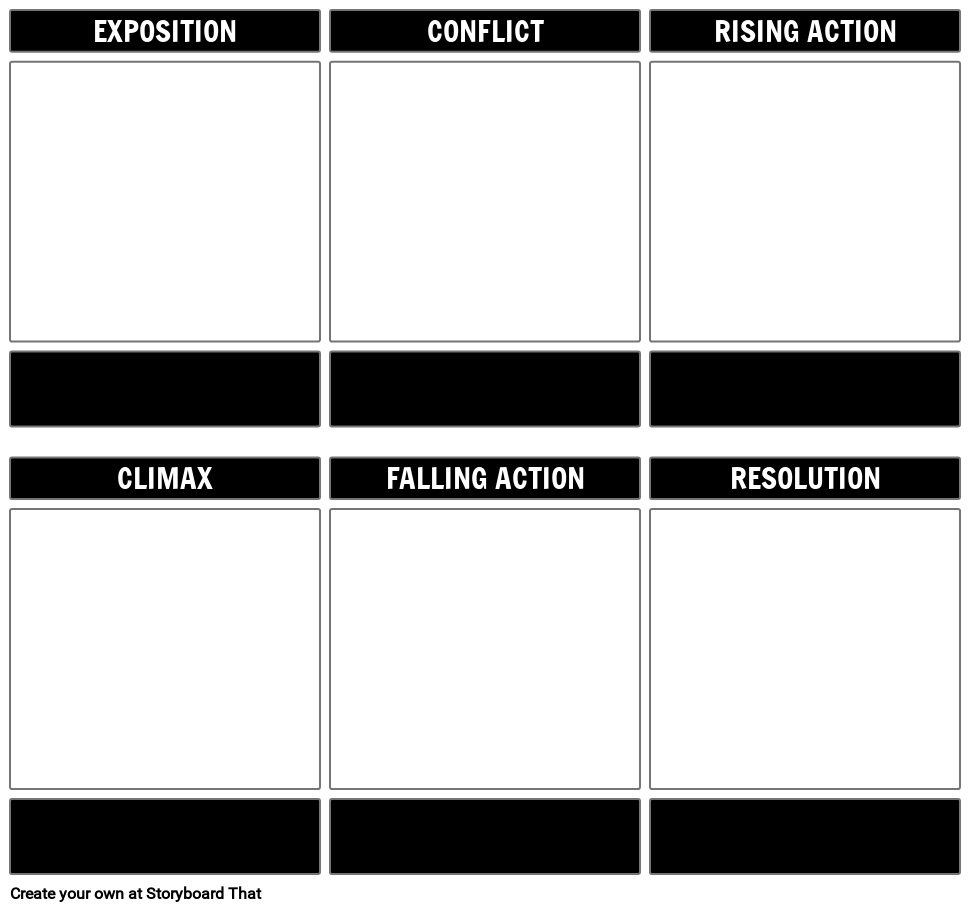Activity Overview
A common use for Storyboard That is to help students create a plot diagram of the events from a story. Not only is this a great way to teach the parts of the plot, but it reinforces major events and help students develop greater understanding of literary structures. Sometimes students will really have to think carefully about which events are major turning points in the plot. The House on Mango Street may be a little trickier than others because of the vignette structure of the book.
Students can create a storyboard capturing the narrative arc in a work with a six-cell storyboard containing the major parts of the plot diagram. For each cell, have students create a scene that follows the book in sequence using: Exposition, Conflict, Rising Action, Climax, Falling Action, and Resolution.
Example The House on Mango Street Plot Diagram
Exposition
Esperanza and her family move to a one bedroom house on Mango Street in Chicago. While the house is better than the old apartment, it still falls short of her expectations.
Conflict
Esperanza battles with her place in the world. She feels as though she doesn’t fit in and wants to escape Mango Street.
Rising Action
Esperanza wants to leave her neighborhood and desires to grow up. She spends time with Sally, a more worldly girl. She gets a job, and one of the old men there forces her to kiss him.
Climax
Esperanza's friendship with Sally leads to a sexual assault at the carnival.
Falling Action
Esperanza returns her focus to Mango Street and accepts that she belongs there. She rekindles friendships with neighbors and her “less mature” friends.
Resolution
Esperanza wants to be strong and have a place of her own. She wants to become a writer who is dependent on only herself.
Template and Class Instructions
(These instructions are completely customizable. After clicking "Copy Activity", update the instructions on the Edit Tab of the assignment.)
Student Instructions
Create a visual plot diagram of The House on Mango Street.
- Click "Start Assignment".
- Separate the story into the Exposition, Conflict, Rising Action, Climax, Falling Action, and Resolution.
- Create an image that represents an important moment or set of events for each of the story components.
- Write a description of each of the steps in the plot diagram.
Lesson Plan Reference
- CCSS: RL.6.2 - Determine a theme or central idea of a text and how it is conveyed through particular details; provide a summary of the text distinct from personal opinions or judgments
- CCSS: RL.6.3 - Describe how a particular story’s or drama’s plot unfolds in a series of episodes as well as how the characters respond or change as the plot moves toward a resolution
Rubric
(You can also create your own on Quick Rubric.)
| Proficient 33 Points | Emerging 25 Points | Beginning 17 Points | |
|---|---|---|---|
| Plot Images | Cells include images that convey events in the corresponding stage of the plot. The images represent an important moment and exemplify the descriptions below them. | Cells include one or two images that convey events from an incorrect stage of the plot. Most images represent an important moment and exemplify the descriptions below them. | Cells include three or more images that convey events from an incorrect stage of the plot. Images depict minor and inimportant moments or do not reflect the descriptions below them. |
| Plot Text | The storyboard correctly identifies all six stages of the plot. The text for each of the six cells correctly breaks down the plot events into appropriate stages. The text gives a logical overview of the plot and includes the most significant events of the book. | The storyboard misidentifies one or two stages of the plot. The text for each of the six cells breaks down most of the plot events into appropriate stages. The text gives a logical overview of the plot, but may omit some significant events of the book. | The storyboard misidentifies three or more stages of the plot. The text for each of the six cells does not correspond to the events of that stage. Overall plot description is not logical. |
| Spelling and Grammar | Spelling and grammar is exemplary. Text contains few or no mistakes. | Text contains some significant errors in spelling or grammar. | Text contains many errors in spelling or grammar. |
Activity Overview
A common use for Storyboard That is to help students create a plot diagram of the events from a story. Not only is this a great way to teach the parts of the plot, but it reinforces major events and help students develop greater understanding of literary structures. Sometimes students will really have to think carefully about which events are major turning points in the plot. The House on Mango Street may be a little trickier than others because of the vignette structure of the book.
Students can create a storyboard capturing the narrative arc in a work with a six-cell storyboard containing the major parts of the plot diagram. For each cell, have students create a scene that follows the book in sequence using: Exposition, Conflict, Rising Action, Climax, Falling Action, and Resolution.
Example The House on Mango Street Plot Diagram
Exposition
Esperanza and her family move to a one bedroom house on Mango Street in Chicago. While the house is better than the old apartment, it still falls short of her expectations.
Conflict
Esperanza battles with her place in the world. She feels as though she doesn’t fit in and wants to escape Mango Street.
Rising Action
Esperanza wants to leave her neighborhood and desires to grow up. She spends time with Sally, a more worldly girl. She gets a job, and one of the old men there forces her to kiss him.
Climax
Esperanza's friendship with Sally leads to a sexual assault at the carnival.
Falling Action
Esperanza returns her focus to Mango Street and accepts that she belongs there. She rekindles friendships with neighbors and her “less mature” friends.
Resolution
Esperanza wants to be strong and have a place of her own. She wants to become a writer who is dependent on only herself.
Template and Class Instructions
(These instructions are completely customizable. After clicking "Copy Activity", update the instructions on the Edit Tab of the assignment.)
Student Instructions
Create a visual plot diagram of The House on Mango Street.
- Click "Start Assignment".
- Separate the story into the Exposition, Conflict, Rising Action, Climax, Falling Action, and Resolution.
- Create an image that represents an important moment or set of events for each of the story components.
- Write a description of each of the steps in the plot diagram.
Lesson Plan Reference
- CCSS: RL.6.2 - Determine a theme or central idea of a text and how it is conveyed through particular details; provide a summary of the text distinct from personal opinions or judgments
- CCSS: RL.6.3 - Describe how a particular story’s or drama’s plot unfolds in a series of episodes as well as how the characters respond or change as the plot moves toward a resolution
Rubric
(You can also create your own on Quick Rubric.)
| Proficient 33 Points | Emerging 25 Points | Beginning 17 Points | |
|---|---|---|---|
| Plot Images | Cells include images that convey events in the corresponding stage of the plot. The images represent an important moment and exemplify the descriptions below them. | Cells include one or two images that convey events from an incorrect stage of the plot. Most images represent an important moment and exemplify the descriptions below them. | Cells include three or more images that convey events from an incorrect stage of the plot. Images depict minor and inimportant moments or do not reflect the descriptions below them. |
| Plot Text | The storyboard correctly identifies all six stages of the plot. The text for each of the six cells correctly breaks down the plot events into appropriate stages. The text gives a logical overview of the plot and includes the most significant events of the book. | The storyboard misidentifies one or two stages of the plot. The text for each of the six cells breaks down most of the plot events into appropriate stages. The text gives a logical overview of the plot, but may omit some significant events of the book. | The storyboard misidentifies three or more stages of the plot. The text for each of the six cells does not correspond to the events of that stage. Overall plot description is not logical. |
| Spelling and Grammar | Spelling and grammar is exemplary. Text contains few or no mistakes. | Text contains some significant errors in spelling or grammar. | Text contains many errors in spelling or grammar. |
More Storyboard That Activities
House on Mango Street, The
Introductory School Offer
ONLY$500
- 1 School
- 5 Teachers for One Year
- 1 Hour of Virtual PD
30 Day Money Back Guarantee • New Customers Only • Full Price After Introductory Offer • Access is for 1 Calendar Year
© 2025 - Clever Prototypes, LLC - All rights reserved.
StoryboardThat is a trademark of Clever Prototypes, LLC, and Registered in U.S. Patent and Trademark Office











